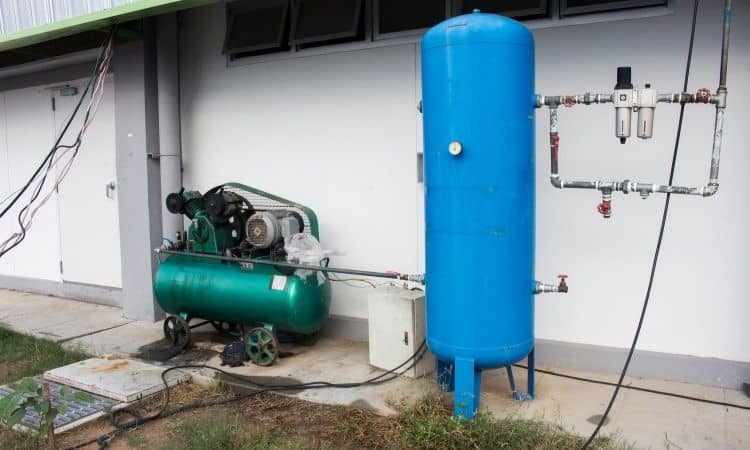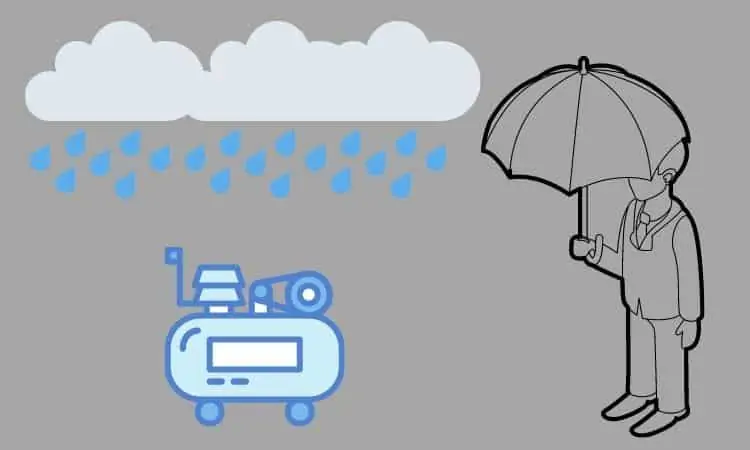Everyone knows that leaving tools out in the rain is a sure-fire way to ruin them – and air compressors are no exception. Though they may seem like heavy-duty pieces of equipment, if there’s one thing that can ruin an air compressor in a hurry, it’s moisture. In this article, I’ll tell you everything you need to know about why you shouldn’t let your air compressor get wet.
Table of Contents
- What Can Happen If Your Air Compressor Gets Wet?
- What To Do If Your Air Compressor Gets Wet
- Can Air Compressors Be Kept Outside?
- In Conclusion
- Can An Air Compressor Get Wet FAQ’s
What Can Happen If Your Air Compressor Gets Wet?
If an air compressor gets wet (whether from rain, flooding, spills, etc.), it can affect performance, accelerate wear, or cause the unit to stop working entirely. Excess moisture can damage or degrade mechanical components, both internal and external. It may also create electrical/fire hazards.
To understand how destructive water can be for an air compressor, let’s look at the different ways moisture can affect its components and ability to function.
Corrosion & Rust
Since air compressors are constructed mostly with metal components, they are susceptible to corrosion and rusting. This is why the air tank needs to be drained of condensate after each use – corrosion can degrade the tank and potentially result in an explosion. The tank exterior may not be in as much danger – unless its paint coating is damaged – but other external components are at risk.
Small metal components such as tank drain plugs, air relief valves, and hose connectors are typically made of brass, which does not rust. However, brass can still corrode when exposed to moisture. This corrosion can cause air leaks or seize valves, which can wear down the motor or cause dangerous over-pressurization, respectively.
If even a small amount of water makes it inside the pump (likely through the air intake vent), it can also corrode the air chamber, discharge valve, unloader valve, and pistons (or rotary screws, depending on the type of compressor you have).
Electrical Issues
Likewise, if water comes in contact with electrical components such as contact terminals or motor windings, it can corrode them and cause electrical malfunctions.
But aside from corrosion, the air compressor’s electrical components can suffer more immediate (and dangerous) effects when exposed to moisture.
Water can cause short-circuits within the pump motor, frying the electrical components or potentially causing an electrical fire. And since water is conductive, a wet air compressor can even cause electric shock in some cases. For these reasons, it’s vital not to attempt operation while the compressor is wet.
Pump Issues
If liquid gets into the pump as described above, it can also cause serious issues if the unit is turned on. Unlike air, liquid cannot be compressed. So when the pistons work to compress the air in the air chamber, any liquid in the cylinder will prevent the piston from completing its full stroke, simultaneously putting an extra load on the motor.
This can cause immediate damage to the cylinder head, piston, connecting rod, crankshaft, and inlet and outlet valves, as the air chamber becomes over-pressurized. It may also cause the motor to overheat or burn out.
And if any water in the air chamber seeps down into the cylinder, it can interfere with proper lubrication and increase wear and tear on mechanical components.
Water In the Air Hose
Another possible consequence of letting your compressor get wet is getting water in the air hose. This is mainly a concern if your air hose is coiled up on the ground or the tool attachment is submerged. If you attempt to use the compressor while there’s water in the hose, that water will come out with your compressed air.
This may not be a huge issue if you’re using a pneumatic wrench (though it may corrode the wrench itself – not to mention scare the daylights out of you when it spurts out), but if you’re filling a tire or applying paint, the last thing you want is water in the line.
What To Do If Your Air Compressor Gets Wet
Not that you know what water can do to your air compressor, it’s easy to see why it’s so important to keep it dry. But if you’re reading this because your compressor already got wet, you’re probably wondering if it’s too late to save it. Well, not necessarily.
If Slightly Wet
If your compressor only got a little wet – something was spilled on it, water from a leaky roof dripped on it, it got rained on briefly before you ran out and rescued it, etc. – you probably don’t have too much to worry about.
First, make sure it’s unplugged. Then, you’ll want to dry it off the best you can with a dry cloth to get any excess water. Next, it’s a good idea to check if water got into the internal components. Take out the intake air filter and see if there’s any moisture on it or in the filter housing. If so, let it dry, leaving the filter housing disassembled.
You’ll also want to examine electrical components for moisture. Your user manual should contain instructions for how to access these. Leave the cover/access panel off and let the compressor dry out for at least a day or two in a climate-controlled environment. You can use a small fan to help speed up the process (as long as the space isn’t too dusty) – but avoid using anything that produces heat, such as a blow dryer.
Once a day or two has passed and everything appears dry, put the filter back in and turn your compressor on, monitoring it closely for sparks, unusual sounds, and performance problems. If you observe any of these, immediately shut it off from the breaker box and disconnect it from power.
If Very Wet
If your compressor was left out in the rain for longer than a few minutes or it was even partially submerged after a flood or other mishap, that’s a different story. With so much moisture, water has likely entered the pump or soaked electrical components.
In this case, your best bet is probably to replace the air compressor. You may be able to take it to a professional repair shop, but if water has flooded the cylinder or gotten into the motor, it’s unlikely that the unit will work again. And even if it does, the internal damage can lead to a premature breakdown or even an electrical fire.
Can Air Compressors Be Kept Outside?

In general, air compressors shouldn’t be kept outside. Doing so leaves them more exposed to ambient moisture, rain, and other weather conditions that can cause wear and tear. However, if certain measures are taken to protect it from the elements, it is possible to keep your air compressor outside.
There are a few key conditions you’ll want to meet if you want to keep your air compressor outside without dramatically shortening its lifespan.
Shelter
First and foremost, you’ll want to keep your compressor housed in some sort of structure to protect it from rain, snow, and debris. It should have adequate space and ventilation to allow the compressor to keep cool.
Solid Foundation
You’ll want your compressor to be sitting on a concrete slab or other solid, level surface to prevent tipping, sinking, or exposure to moisture from the ground. It should be an area that won’t flood during a storm.
Clean Air
You’ll also want to keep the area around the compressor clean to avoid the intake of excessive dirt and dust. It’s also best to keep a close eye on the air filters and clean the compressor regularly.
Electrical Safety
Air compressors and extension cords don’t get along very well, so you’ll want to plug the compressor directly into a GFCI-protected outlet – preferably on its own dedicated breaker.
Winterization
Extreme cold can cause a range of problems for an air compressor (particularly if moisture is involved), so you’ll want to protect it from freezing temperatures as best you can. Your user manual or manufacturer may have instructions and products to help you winterize your compressor.
But for a more involved discussion on winterization and putting an air compressor outdoors, check out this article.
In Conclusion
As you can see, it’s best not to allow your air compressor to get wet. Even excess humidity in the air can destroy it from the inside out – if you don’t empty the tank regularly, that is. The good news is, you can typically save it without costly repairs if it was only exposed to a little bit of moisture. Of course, if you have any doubts, you’re better off hiring a pro to look at your compressor and assess the damage.
Can An Air Compressor Get Wet FAQ’s
Can an air compressor get wet?
An air compressor can get wet if it is exposed to moisture or if it is not properly protected against moisture buildup. Moisture can cause damage to air tools and machinery, and it can also promote the growth of bacteria and mold in the compressed air system.
How does moisture buildup occur in an air compressor system?
Moisture buildup occurs when humid air enters the compressed air system and water vapor condenses into liquid form as the air cools during the compression process. This moisture can accumulate in the air receiver tank and in the air distribution system, causing damage to the system and reducing its overall efficiency.
What is an air dryer and how does it prevent moisture buildup?
An air dryer is a device that removes moisture from compressed air to prevent damage to air tools and machinery. There are two main types of air dryers: desiccant air dryers and refrigerated air dryers. Desiccant air dryers use a material that absorbs moisture from the air stream, while refrigerated air dryers use a cooling process to condense and remove moisture. Both types of air dryers can effectively prevent moisture buildup in an air compressor system.
Do all industrial air compressors need an air dryer?
Not all industrial air compressors require an air dryer, but it is recommended for systems that generate high levels of moisture or that require dry air for proper operation. Air dryers can help extend the lifespan of air tools and machinery by preventing moisture-related damage.
How can I tell if my air compressor system has too much moisture?
You may notice excessive water in the air stream, rust or corrosion on machinery, or decreased efficiency and performance of air tools. Moisture can also cause issues with air pressure and air flow, leading to production delays and increased maintenance costs.
Can air temperature affect moisture buildup in an air compressor system?
Yes, air temperature can affect moisture buildup. Cold air can cause more condensation and moisture buildup, while hot and humid air can increase the amount of water vapor in the air stream. Proper temperature control and air dryer selection can help prevent moisture-related issues. Refrigerated air dryers are particularly effective at removing moisture from warm and humid air streams.


